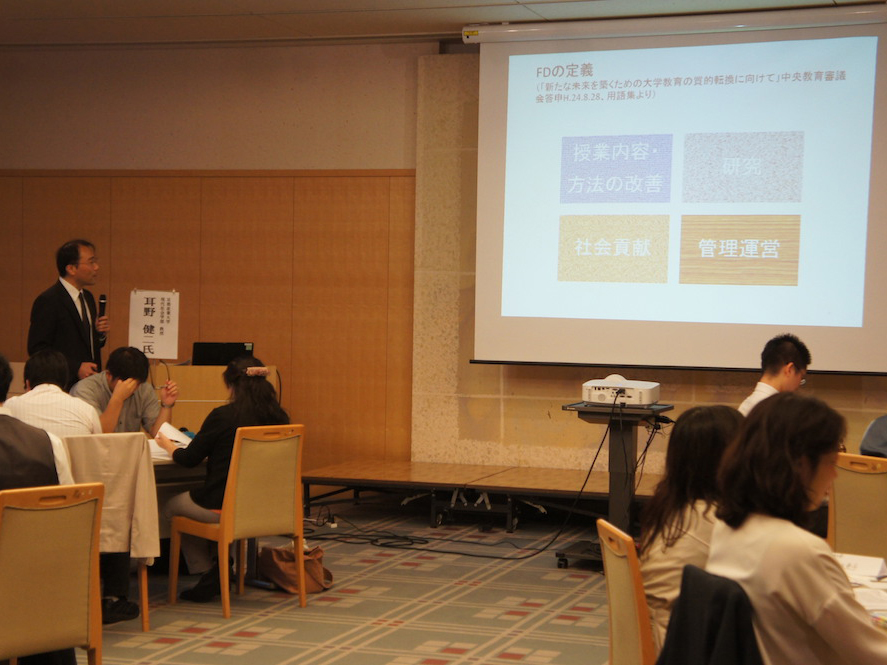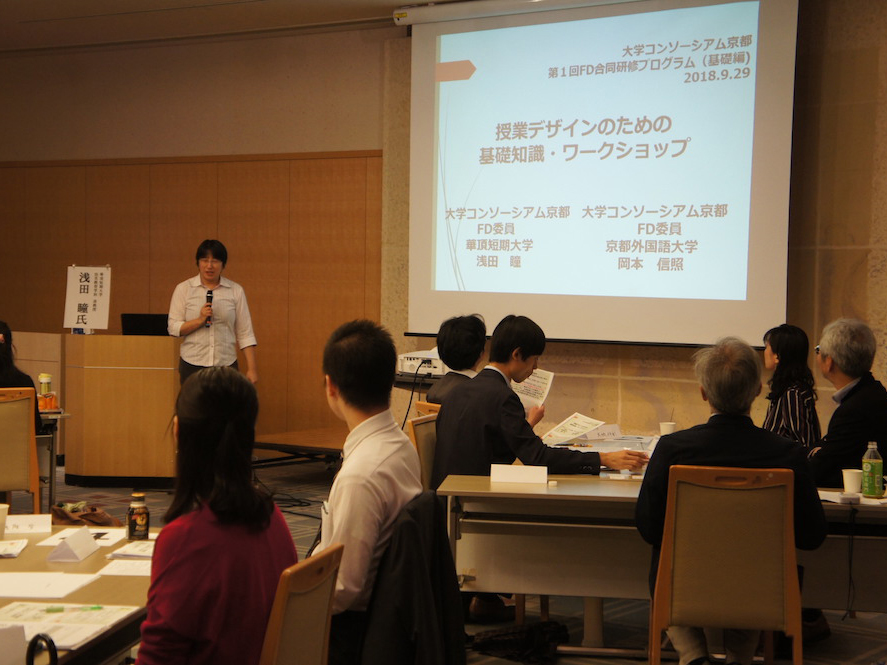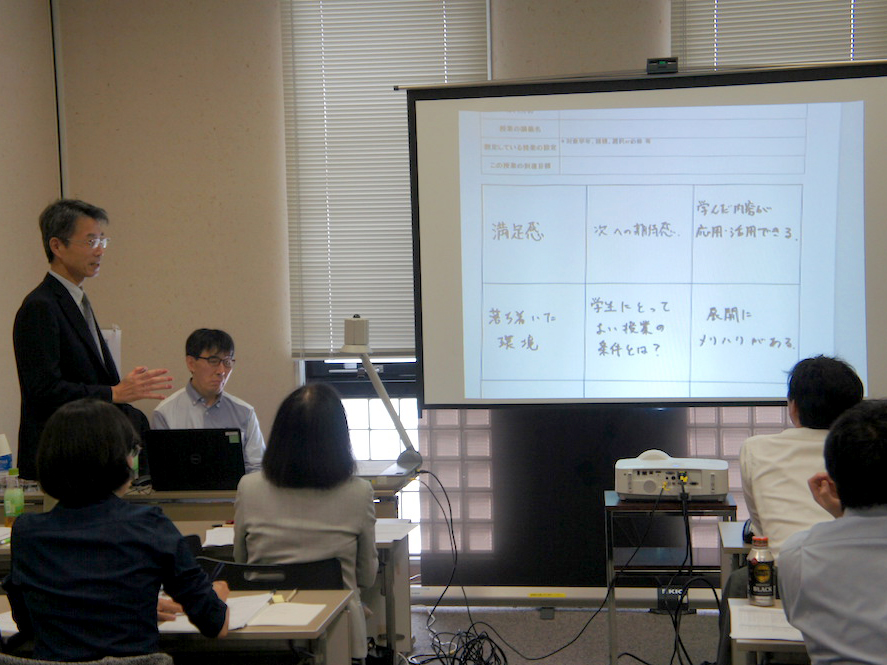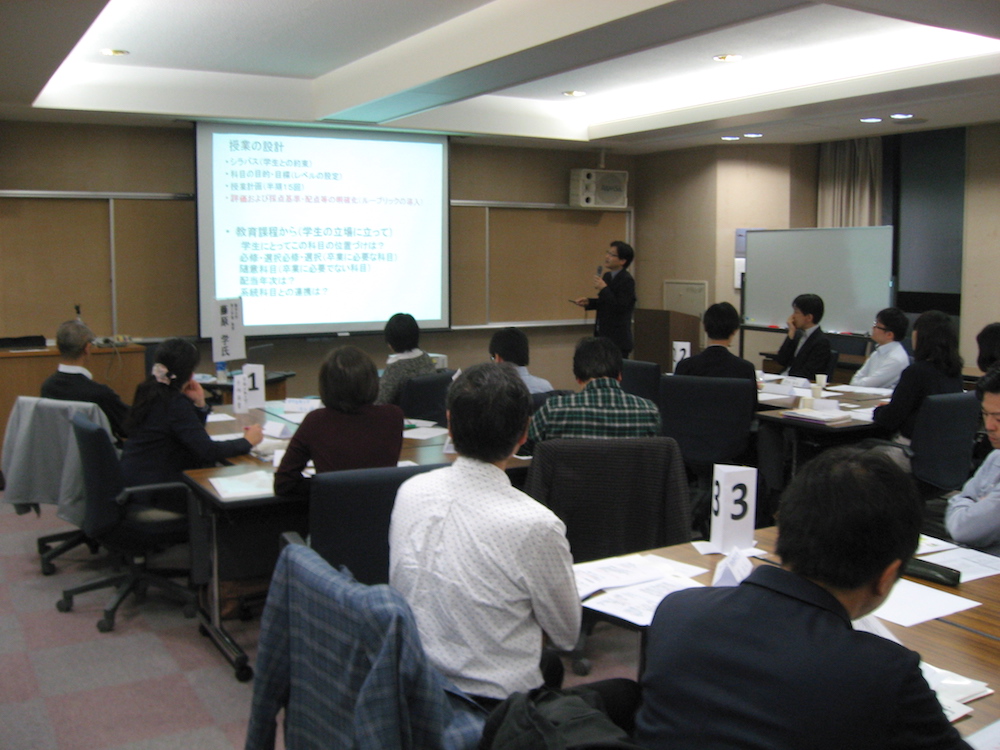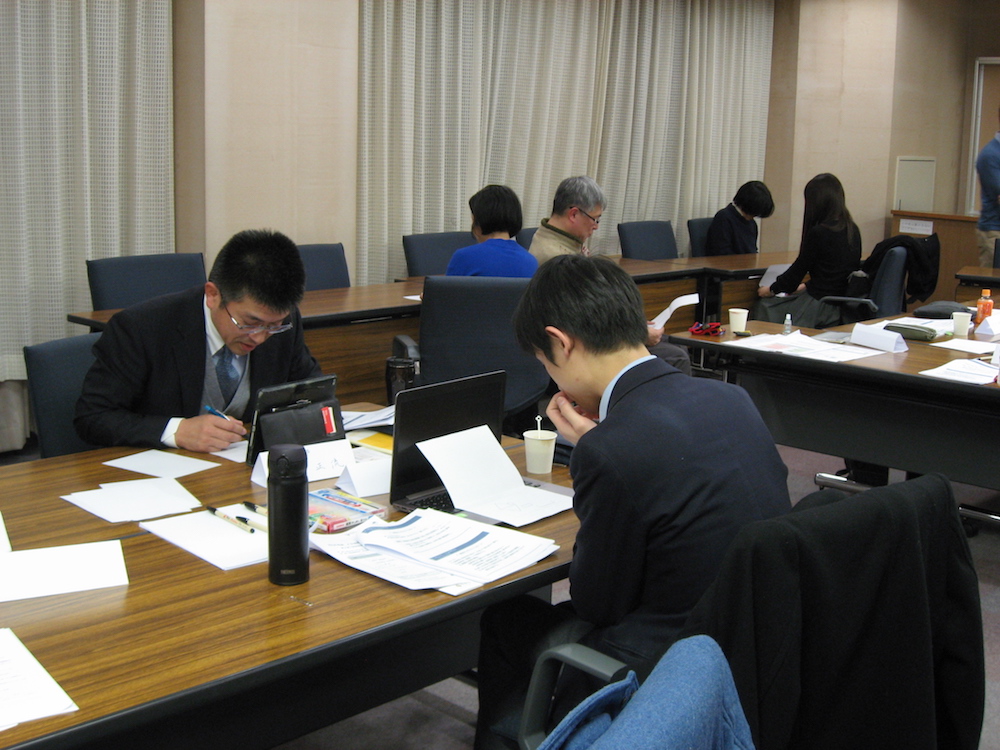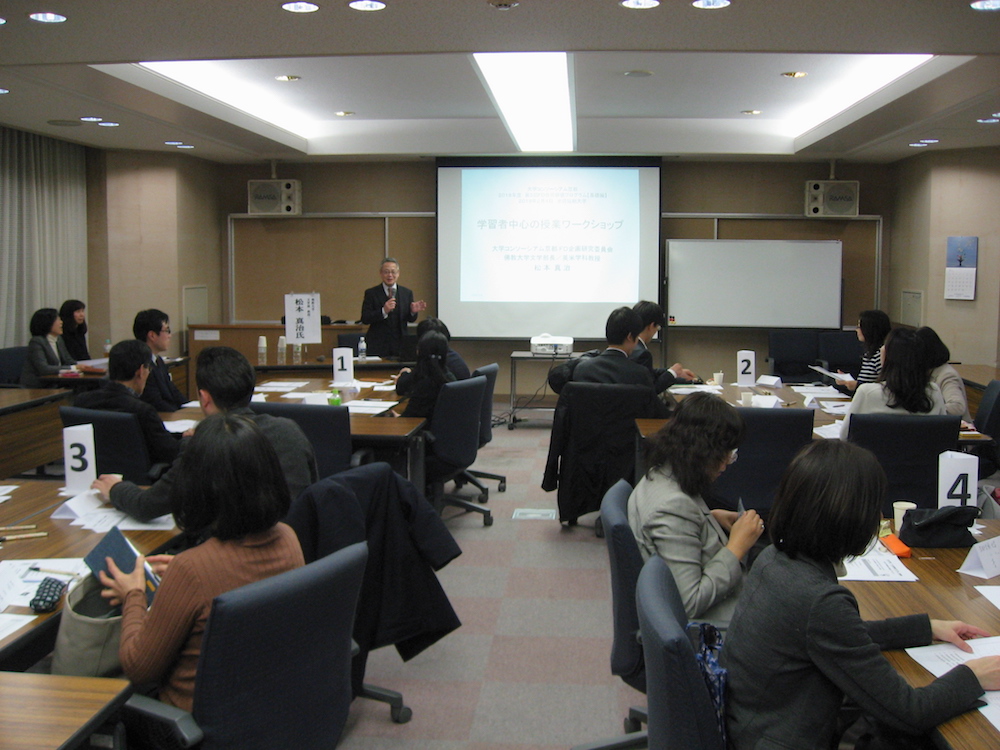Business Overview
Depending on the theme, it is either “Basic” or “Advanced”.
As an organizational effort for faculty members to improve and enhance their teaching content and methods, the University Consortium Kyoto has been promoting FD activities in the Kyoto area together with member universities since 1995, shortly after its establishment.
The FD Joint Training Program is a training program that integrates and reorganizes the following two programs that were implemented until FY2017.
It consists of two sections: the “Basics,” which aims to acquire basic knowledge in teaching, and the “Advanced,” which covers a wide range of themes aimed at improving the quality of education.
◆FD Joint Training Program for New Teachers: A training program that complies with the “Standard Framework for New Teachers” proposed by the National Institute for Educational Policy Research with the aim of acquiring the knowledge and skills necessary for university teachers.
◆ University Education Power-up Seminar: A workshop-style study session that deals with themes that are useful for the educational (educational support) activities of individual university faculty and staff.
About the FD Joint Training Program [Development] ⇒ [Click here for details]
Outline of the event
In fiscal 2018, the program will be held five times with the following contents.
* There is an application deadline for each session, but if there are remaining seats, we will accept applications even after the application deadline.
* There is an application deadline for each session, but if the capacity is reached, the application will be closed before the application deadline.
| Part 1 | |
|---|---|
| Date: | Saturday, September 29, 2018 13:00~17:15 |
| Venue | Campus Plaza Kyoto 2nd Floor Hall (Get off at Kyoto Station on the Kyoto Municipal Subway Karasuma Line, Kintetsu Kyoto Line, and JR Line.) 5 minutes walk. ) |
| Overview | “About the University Community” University Consortium Kyoto Secretariat (Deputy Secretary-General: Masaru Yoshisada) There are a variety of FD initiatives that can be considered. In addition to individual initiatives, inter-university collaboration, joint initiatives, and information exchange with other universities can also be expected to have a significant effect. In this training, we will consider the ideal university community as a place for collaboration from the perspective of FD through an overview of the University Consortium Kyoto, the business of the University Consortium Kyoto, the founding spirit of the university to which each participant belongs, the composition of the faculties, and the characteristics of the curriculum. |
| “Basic Knowledge of FD: Toward Sustainable Capacity Development” Lecturer: Kenji Otono (Professor, Faculty of Contemporary Social Studies, Kyoto Sangyo University) The environment surrounding FD is also changing significantly. In addition to mere educational improvements and innovations, various ways of thinking and initiatives related to higher education itself are required. In this training, students will deepen their understanding of FD by reconsidering the current environment surrounding universities, such as educational administration, from basic knowledge about FD and higher education, and deepen information exchange and mutual understanding among those involved in university education. |
|
| “Basic Knowledge and Workshops for Lesson Design” Lecturer: Hitomi Asada (Associate Professor, Department of Early Childhood Education, Huacho Junior College) Lecturer: Nobuteru Okamoto (Professor, Faculty of Foreign Studies, Kyoto University of Foreign Studies) The syllabus plays an important role in ensuring a well-planned lesson. The items and contents that should be included in the syllabus are also diversifying. In this training, we will focus on the syllabus and consider the basic concepts and points to keep in mind regarding lesson design. In addition, through workshops, students will learn specifically about the consistency of higher-level educational policies and goals, such as curriculum policies (CPs) and diploma policies (DP), with individual subjects and classes. |
|
| Application deadline: | Monday, September 24, 2018 |
| Part 2 | |
|---|---|
| Date: | Saturday, October 13, 2018 13:00~18:00 |
| Venue | Campus Plaza Kyoto, 5th Floor, Seminar Room 2 (Get off at Kyoto Station on the Kyoto Municipal Subway Karasuma Line, Kintetsu Kyoto Line, and JR Line.) 5 minutes walk. ) |
| Overview | “Lesson Design and Lesson Practice Workshop” Lecturer: Kazuharu Abe (Professor, Faculty of Career Development, Kyoto Koka Women’s University) Each actual lesson can be said to be the embodiment of the learning objectives and learning content described in the syllabus. Each lesson must be based on a clear design. In this training, you will learn about the basic concepts of lesson design based on these ideas and examples of design methods. In addition, participants will conduct a mutual evaluation of specific lesson design methods and their practices through workshops. |
| Application deadline: | Monday, October 8, 2018 |
| 3rd | |
|---|---|
| Date: | Monday, November 12, 2018 18:00~20:00 |
| Venue | Ikebo Junior College Senshinkan, 6th floor, Conference Room 1 (A 2-minute walk from Shijo Station on the Karasuma Subway Line and Karasuma Station on the Hankyu Kyoto Line (Exit 25). Get off at the city bus “Shijo Karasuma” and walk for 2 minutes. ) |
| Overview | “Basic Knowledge and Workshops for Grading” Lecturer: Manabu Fujiwara (Professor, Faculty of Science and Engineering, Ryukoku University) Grades should be evaluated as achievement against the learning objectives listed in the syllabus. Grading should be rigorous and accountable, not vague. In this training, you will learn the basic concept of grading, points to note when creating rubrics, points to note, and specific examples. In addition, workshops will be held to address specific grading criteria and issues, and participants will exchange opinions with each other. |
| Application deadline: | Monday, November 5, 2018 |
| No.4 | |
|---|---|
| Date: | Monday, January 21, 2019 18:00~20:00 |
| Venue | Ikebo Junior College Senshinkan, 6th floor, Conference Room 1 (A 2-minute walk from Shijo Station on the Karasuma Subway Line and Karasuma Station on the Hankyu Kyoto Line (Exit 25). Get off at the city bus “Shijo Karasuma” and walk for 2 minutes. ) |
| Overview | “Learning Support and Special Needs Workshop” Lecturer: Jun Murata (Associate Professor, Center for Student Support, Kyoto University) In recent years, the number of students has become more diverse, and there is a wide demand for study support for various students. In particular, with regard to support for students with disabilities, the enactment of the Act on the Elimination of Discrimination against Persons with Disabilities has made it a legal obligation or obligation for each university to “prohibit unfair discriminatory treatment” and “provide reasonable accommodation” to students with disabilities. In this training, you will first learn basic knowledge about “disability” and then give an overview of the current situation of support for students with disabilities at universities. In addition, I would like to think about support for students with developmental disabilities, which has been increasing in recent years, through workshops. |
| Application deadline: | Monday, January 14, 2019 |
| Vol.5 | |
|---|---|
| Date: | Monday, February 4, 2019 18:00~20:00 |
| Venue | Ikebo Junior College Senshinkan, 6th floor, Conference Room 1 (A 2-minute walk from Shijo Station on the Karasuma Subway Line and Karasuma Station on the Hankyu Kyoto Line (Exit 25). Get off at the city bus “Shijo Karasuma” and walk for 2 minutes. ) |
| Overview | “Learner-Centered Classroom Workshop” Lecturer: Mieko Sawada (Professor, Department of Fundamental Sciences, Kyoto Institute of Technology) Lecturer: Shinji Matsumoto (Professor, Faculty of Letters, Bukkyo University) Lecturer: Ms. Kirie Mori (Associate Professor, Department of Childcare, Junior College, Heian Jogakuin University) Regardless of the field or field, from the perspective of independent learning, there is a need to shift from one-way knowledge transfer classes, which have been common in the past, to learner-centered classes. “Active learning” is considered to be one of them. In this training, we will take up active learning and learn about the background to its attention, its expected effects, and its problems. In addition, through workshops, we will create and peer-evaluate actual lesson design plans that incorporate active learning. |
| Application deadline: | Monday, January 28, 2019 |
◆ 1st and 2nd information leaflets [Download from here]
◆ 3rd, 4th, 5th information flyer [Download from here]
◆ Program information bulletin board (A3) [Click here to download]
≪Common to each time≫
- Target
- Faculty and staff of universities and junior colleges
* Full-time or part-time, and the number of years of work does not matter - Occupancy
- About 20 people per session (first-come, first-served basis)
- Participation Fee
- University Consortium Kyoto Member Universities and Junior Colleges: 1,000 yen/time
For those other than the above: 2,000 yen/time
*Please pay the participation fee at the reception on the day of the event. - Organizer
- University Consortium Kyoto
Implementation Report
In fiscal 2018, the program was subdivided into two sessions of 1.5 days × the previous fiscal year, and was held for a total of 5 sessions on 7 themes from September 29, 2018 ~ February 4, 2019.
The number of participants was 11 in the first session, 9 in the second, 17 in the third, 11 in the fourth, and 15 in the fifth.
In the questionnaire for participants, the percentage of respondents who answered “satisfied” or “somewhat satisfied” was almost 100% for each training, which seemed to be very satisfying.
In addition, in the open-ended section, “I understood the necessity of participation by understanding the background of the introduction of FD” (“Basic Knowledge of FD: Toward Sustainable Capacity Development”), and “I was able to reaffirm the importance of consistency between curriculum and lesson design.” (“Basic Knowledge and Workshop for Lesson Design”), “I was able to learn about lesson plan planning, development of teaching methods, and model examples of classes that are easy for students to understand,” “I gained an opportunity to rethink my own classes from various angles” (“Lesson Design and Lesson Practice Workshop”), “Methodologies for grading and syllabus creation, which I usually do almost arbitrarily, I was able to compare and discuss with other teachers” (“Basic Knowledge and Workshop for Grading”), “I received a variety of knowledge about disabilities and very meaningful advice on how to deal with students in the future” (“Learning Support and Special Needs Workshop”), and “It was a good opportunity to reflect on my own practice” (“Learner-Centered Lesson Workshop”). It seemed that it was a great reference for improving the class in the future.
Inquiries
University Consortium Kyoto FD Project
TEL 075-353-9163 FAX 075-353-9101
〒600-8216 Shimogyo-ku, Kyoto-shi, Nishitoin-dori, Shiokoji, Shimo-ku, Kyoto, Campus Plaza Kyoto
* Reception hours: Tuesday ~ Saturday 9:00 ~ 17:00 (excluding year-end and New Year holidays)














